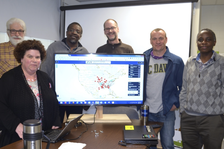Posted: May 9, 2018
The Department of Plant Pathology and Environmental Microbiology recently hosted a group of researchers from across the country with the objective of building research relationships and expanding educational opportunities.

From left are Sarah Pethbridge, Cornell University; Scott Isard, Penn State University; Pierce Paul, Ohio State University; Paul Esker, Penn State University; Neil McRoberts, University of California-Davis; Peter Ojiambo, North Carolina State University.
The Department of Plant Pathology and Environmental Microbiology recently hosted a group of researchers from across the country with the objective of building research relationships and expanding educational opportunities.
The program -- funded through the Francl Endowment -- was organized by Paul Esker, assistant professor of epidemiology and field crop pathology. The guests were Sarah Pethybridge, assistant professor of plant pathology, Cornell University; Neil McRoberts, associate professor of plant pathology, University of California-Davis; Pierce Paul, professor of cereal pathology and epidemiology, Ohio State University; and Peter Ojiambo, associate professor of entomology and plant pathology, North Carolina State University.
According to Esker, t he visit gave the group an opportunity to discuss research and education in plant disease epidemiology, with the goal to define new directions that the group could take in the future to strengthen and increase current collaborations. Scott Isard, professor of aerobiology at Penn State, also participated in the discussions and described the current iteration of the Integrated Pest Information Platform for Extension and Education, known as iPiPE.
The format for the meetings was informal, enabling an open and honest discussion in which participants shared their current research, potential ideas and how best to strengthen existing collaborations. By the end of the week, the group had defined two new collaborations. One initiative was related to the development of a paper regarding experiences and tips for improving data analysis and interpretation of results obtained from plant pathological studies. The second involved theoretical and empirical research regarding the use and importance of thresholds in integrated disease management.
The visitors also interacted with other faculty, postdocs and graduate students, with an eye toward identifying additional collaborations on joint topics of interest in the future. The group also found time to discuss topics such as baseball and cricket, making for an enjoyable week for all, Esker added.
The participants agreed that each member of the working group will take a turn hosting the meeting in the future on an annual basis.

